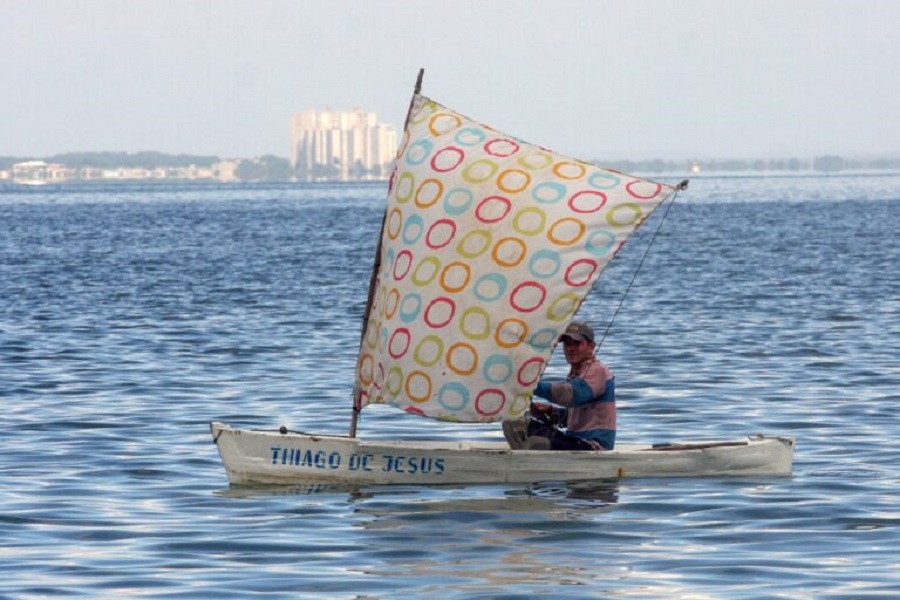RIO DE JANEIRO, BRAZIL – In the early morning, Franklin Romero, thin and with sinewy arms, points the oars he made himself and heads out into Lake Maracaibo bay, one of the largest in South America.
He suffers from the gasoline drought that has worsened for the past 3 years in the interior of a country that went from refining 1.3 million barrels of oil per day to importing it, something that experts blame on mismanagement and corruption.

“We use sails because there is no gasoline,” he said upon returning from his trip while extracting the water that got into the boat. The sails are made of wooden sticks and cloth made from sheets or plastic tarp.
At a leisurely pace, Franklin returned at around 10 AM. When he set sail, just before 6 AM, the water was so still that he rowed to a beach in Los Puertos de Altagracia, a coastal town overlooking the beautiful landscape of Maracaibo, capital of Zulia state.
He caught seven medium-sized croakers, a white-fleshed fish highly prized in local cuisine. He sold 5 and kept 2 to take home, where his 2-year-old son and his wife are waiting for him. “It’s already a habit to go rowing or sailing,” says the 28-year-old fisherman.
Despite their slower sailing, many fishermen have adapted motor pumps to replace outboard motors, which require up to 20 liters of fuel, a luxury in this region plagued by closed gas stations and kilometer-long lines at the few still in operation.
At US$2 per liter, the black market is the alternative for most, while the Nicolás Maduro government points out that the harsh sanctions imposed by the United States are blocking purchases of fuel and derivatives for refining.
More than one fisherman buys gasoline “on credit” to pay for it with a profit averaging US$25 on “very good” days. At least US$8 are spent to pay for the 4 liters needed for the motor pump, something paradoxical in a Venezuela that for years kept gasoline virtually free. “I didn’t catch anything. Sometimes you return empty-handed and with the fuel debt on your back.”
“Today I lost gas, I lost my job and I didn’t catch anything, I only went to wear myself out,” says a disappointed Jonathan, father of 6 who returns with a handful of scrawny fish and 2 shrimp.
The chances of finding bait to catch fish are limited. “You grab bait a day before and the next day you catch fish. If we had fuel it wouldn’t matter, but now we go out to venture,” he says.
A colleague of Jonathan recounts that more than once they were stranded off the coast of Maracaibo with no fuel. “After we sell the fish, we have had to sleep there and wait for the next day to cross the lake under sail, using the wind to our advantage.”
In addition to these hardships are the oil spills. “All that stain you see out there is oil,” says one of the fishermen who uses a knife to remove the blackish and oily layer that sticks to their boats every time they set out.
In fact, Lake Maracaibo accumulates some 25,000 kilometers of pipes in its bed as a result of 100 years of oil extraction, explains Gustavo Carrasquel of Azul Ambientalistas NGO. “It is not a single spill, but constant leaks,” he laments.
From the bus to the bicycle cab
In Maracaibo, on the other side of the bay, bicycle cabs proliferate, carrying passengers on bikes modified with a third wheel, seats and a fabric roof to cover themselves from the perennial sun.
One of the “bicitaxis” or “ciclotaxis” is driven by Manuel, a former driver of buses with a capacity for 50 passengers. “Because of the gasoline issue, the owner had to close and I was left jobless,” explains this 28-year-old man, while fixing one of the bicycle’s tires.
Manuel, expecting his first child and who asked to keep his last name confidential, says that they needed about US$200 a day in fuel to keep a bus running, unaffordable with a fare in local currency, the bolivar, pulverized by almost 4 years of hyperinflation.
Now he depends on his legs to put food on the table, as does Hender Urdaneta, a member of the Militia, a corps linked to the Armed Forces.
This militiaman says that his back hurts from pedaling, but he is forced to by necessity. His salary is not enough and his wife, who lost a kidney, needs medication. Several relatives have left for Colombia, which has received almost 2 million Venezuelans.
But Hender, 51, refuses to emigrate. “Here I was born and here I will die, fighting with my boots on, as a soldier of the homeland that I am, as a militiaman of the homeland that I am and here working with my bicycle, God will help us….”.

